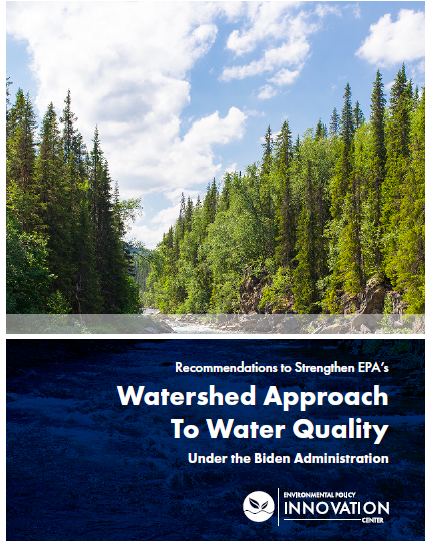New Reports Deliver Water Recommendations to Speed the Replacement of Toxic Lead Water Pipes and Improve Water Quality by Strengthening the U.S. EPA Watershed Approach
Water quality remains a persistent public health and environmental challenge in the United States despite decades of efforts to deliver clean water for drinking and recreational activities.
Two Quantified Ventures team members – Director Tee Thomas and Managing Director George Kelly – recently collaborated with staff from the Environmental Policy Innovation Center on papers that make recommendations related to two important topics facing the water sector:
Speeding the replacement of toxic lead water pipes
Improving water quality by strengthening the U.S. EPA’s watershed approach
Tee Thomas co-authored the report Replacing Toxic Lead Water Pipes Faster: Innovative Procurement and Financing Approaches Are Just as Important as Federal Funding with staff from the Environmental Policy Innovation Center, ECT, Inc, and Corvias. The Robert Wood Johnson Foundation provided support for the report.
The report highlights three procurement and financing tools to complement new federal and state appropriations to rapidly accelerate the speed of lead pipe replacement:
Public Private Partnerships (P3s) and Community-Based Partnerships, which could specifically help small to mid-sized cities and water utilities that may struggle with the administrative burdens of government funding.
Pay for Success or Outcome Contracting authority and initiatives could be structured to incentivize pipe replacement in burdened communities and would allow businesses to be paid a predictable and cost-effective rate for documented replacement of lead pipes.
Environmental and Social Impact Bonds could increase available capital and help maximize the private sector and municipal bond financing contribution in conjunction with new federal State Revolving Fund (SRF) appropriations.
George Kelly co-authored the report Recommendations to Strengthen EPA’s Watershed Approach To Water Quality Under the Biden Administration with staff from the Environmental Policy Innovation Center. The Sand County Foundation and the Walton Family Foundation provided support for the report.
The report provides recommendations to facilitate greater use of watershed approaches for Clean Water Act permit compliance, such as:
Regulatory refinement is needed. While the EPA should respect state powers around water quality regulation and pollution reduction, states would benefit from far more clarity and consistency about what EPA regions would accept. Water quality trading has been held back by a lack of regulatory certainty, as most of the policy pronouncements have been in guidance memos, which EPA regions and individual staff have interpreted differently. The report authors recommend additional policy and regulatory refinement to bolster the market and to clarify what is legally authorized by the EPA.
Trading and market focused terminology is inaccurate and should be replaced with watershed-based approaches and crediting. EPA already supports watershed approaches to NPDES permitting but programs are stymied by market-focused terminology that is inaccurate and has accumulated a lot of political baggage. The authors recommend changing terminology to focus on watershed crediting as an inclusive term that covers watershed project procurement from third parties, sole source contracting, public-private partnership approaches, trading programs, and point source-implemented watershed programs. At the heart of all of these is recognition of units of pollution improvement that a state and EPA will accept.
Water quality regulation and pollution reduction must integrate environmental justice and equity. Watershed-based approaches to water quality can be a partial solution to environmental justice problems if the EPA creates preferences for project types and locations and supports additional payment for co-benefits while using both to prioritize projects that address equity issues.


